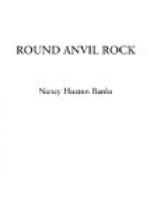The court-house in the wilderness stood quite alone, with no other building near. There was not even a fence round it, nor so much as a hitching-post in front of the rude door which was rarely closed. Those who came—the judge, the jury, the lawyers, the clients, the spectators—all hitched their horses to the swinging limbs of the trees. The sole sign of man’s handiwork, beyond the log walls of the court-house itself, was a crude attempt at bridge-building. A creek ran between the court-house and the home of Judge Knox, who was the judge of the court, and over this a few rough boards had been loosely laid across two rotting logs. The structure being both weak and unsteady, it was the judge’s habit to dismount on coming to the bridge and to cross it on foot, leading his horse by the bridle. It was then but a stone’s throw to the court-house, and as he was heavy, clumsy, and an awkward rider, he did not mount again, but walked on till he came to the spot where he always stopped to tie the bridle to the same limb. And there he invariably tied it in his absent-minded way, without ever thinking of looking round to see if the horse was tied with the bridle. Sometimes he was and again he was not, for this was as that sagacious and dignified animal himself thought best. He commonly made up his mind upon this point when they got to the bridge, where he could tell easily enough by the judge’s gait in crossing over, whether or not it would be advisable to follow. If the horse then saw fit to turn back and go home, as a hint to the family to send for the judge at the proper time, he never hesitated to pull his head out of the old bridle which he could do very easily. So that the judge sometimes went on and tied the empty bridle in the usual place, never knowing the difference; while his horse calmly turned round and soberly walked back to the stable. Seeing him thus pass the windows, the good people of Cedar House sighed a little, and shook their heads, but they nevertheless always knew exactly what to do.
On this late October day, however, the horse followed the judge without demur, assured by his own observation that all was right. The judge, honest, simple soul, rarely failed to turn over a new leaf and make a fresh start on the morning after the meeting of the grand jury, which gravely and respectfully found an indictment against him almost as regularly at it met. He had already assessed and—gravely ordering it written up—paid his own fine on this occasion without a murmur, as he always did, and he was now quite sober and ready to resume his place on the bench. He had held it for a long time to the public satisfaction; and he continued to hold it for many years afterward with honor, ability, and distinction, notwithstanding these occasional lapses. His one weakness was of course well known but his profound knowledge of the law, and his unimpeachable integrity were still better known. It was said of him that he never had anything to say which could not be shouted out from the court-house door. And these qualities were sorely needed on the bench of the wilderness, more sorely needed at this time than ever before or since.




